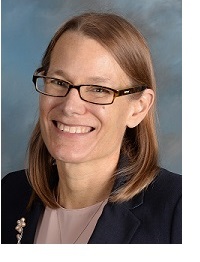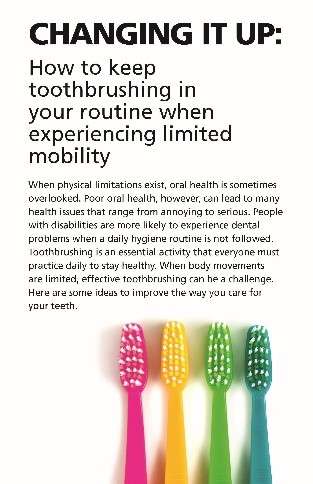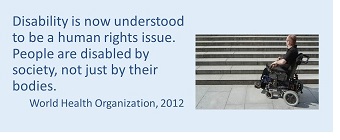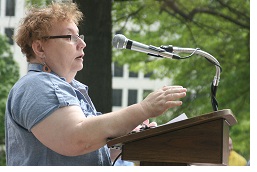
Kansas Disability and Health Program News
Fall 2019
In this Issue:
- Greetings from the Director
- New Oral Health Documents Available
- Feeling Good about your Smile Training
- Training Medical Students about People with Disabilities
- Community Health Environment Checklist (CHEC )
- Consumer Advisory Board Profile: Kathy Lobb
- Kansas DHP Staff Lead Inclusion Special Issue
- Reaching out to Local Health Departments
- DHP Presentations
- Training in Disability Awareness for Health Care Providers
- Participants Needed for 2019 Survey on Health and Disability
Greetings from the Director
 Happy Autumn to all! As the temperatures get colder and the holidays approach, it can be difficult to keep yup with needed physical activity and attend to good nutrition and oral health. Fortunately, many resources are available to support healthy habits throughout the year. We invite you to explore our website and Facebook page for ideas or contact us today to schedule a training or informational presentation for consumers or health professionals.
Happy Autumn to all! As the temperatures get colder and the holidays approach, it can be difficult to keep yup with needed physical activity and attend to good nutrition and oral health. Fortunately, many resources are available to support healthy habits throughout the year. We invite you to explore our website and Facebook page for ideas or contact us today to schedule a training or informational presentation for consumers or health professionals.
Wishing you a healthy and happy holiday season,
Jean Hall, PhD
Director, Kansas Disability and Health Program
New Oral Health Documents Available
 Oral Health Kansas and the Kansas Disability and Health program convened an advisory committee to develop two resources for people with mobility and/or physical limitations that impact their ability to practice good oral health: Changing it Up: How to Keep Toothbrushing in your Routine when Experiencing Limited Mobility and Resources for Adaptive Aids.
Oral Health Kansas and the Kansas Disability and Health program convened an advisory committee to develop two resources for people with mobility and/or physical limitations that impact their ability to practice good oral health: Changing it Up: How to Keep Toothbrushing in your Routine when Experiencing Limited Mobility and Resources for Adaptive Aids.
If your organization is interested in receiving copies of these resources, email Kim Bruns at kbruns@ku.edu
Feeling Good About Your Smile Training
Feeling Good About Your Smile is a 90 minute workshop for adults with IDD and their personal assistants or support staff. A registered dental hygienist will come to your agency and complete hands-on activities to help participants learn about causes of cavities, how to brush and floss correctly, and how to choose tooth-healthy snacks. If you are interested in having this workshop at your agency, email Kim Bruns at kbruns@ku.edu
Training Medical Students About People with Disabilities
 Recently, the Disability and Health Program was invited to train medical students about the social model of disability, health disparities experienced by people with disabilities, and how to provide health care in a way that accommodates all patients.
Recently, the Disability and Health Program was invited to train medical students about the social model of disability, health disparities experienced by people with disabilities, and how to provide health care in a way that accommodates all patients.
As one session of a class taught by a physician at Children's Mercy Hospital in Kansas City, Dot Nary delivered a one-hour lecture to 115 second-year students enrolled in a six-year bachelor's degree/MD program. The lecture focused on what physicians need to know about people with disabilities to provide equitable care that enhances community living. The lecture was followed by presentations and discussion with a panel of local advocates, including a person with deafness, a person who lost her vision as an adult, a person with a developmental disability who works at the hospital, and Dr. Nary, who represented the perspective of people with mobility disabilities. The panel provided insight into the ways people with various disabilities experience the health care system.
After the class, students were asked to share something new they learned. They said:
"I learned that the goal shouldn't be to cure the disability but help the person who has it in the best way possible to help them live the life they want."
"I learned that the healthcare system is lacking in proper resources to accomodate for patients with disabilities."
"I learned a lot about the negative biases and views of society that enhanced the view of disability. A lot of individuals can live normal, healthy lives with a disability."
Thanks to Dr. Alison Kaye and Kathy Smith of Children's Mercy Hospital for inviting the Disability and Health Program to contribute to training these future medical professionals. We look forward to participating in the class again next year.
Community Health Environment Checklist (CHEC)
The CHEC is a tool that trained assessors from centers for independent living can use to measure the usability of health-related facilities for people with mobility impairments. Last year, more than 20 CHECs were completed in Kansas. Topeka Indpendent Living Resources has already completed three CHECs this year, assessing a dental office, a community center, and a YMCA facility. The CHEC is a great opportunity to connect with medical and health professionals and improve accessibility for people with mobility impairments. If staff at centers for independent living are interested in the free training, contact Kim Bruns at kbruns@ku.edu
Consumer Advisory Board Profile: Kathy Lobb
 In each newsletter, we profile a member of the Disability and Health Program's Consumer Advisory Board. This issue highlights Kathy Lobb.
In each newsletter, we profile a member of the Disability and Health Program's Consumer Advisory Board. This issue highlights Kathy Lobb.
When she was 18 days old, Kathy's family moved to Kansas from Fort Huachuca, Arizona. She doesn't recall the move, but she does remember moving from Kansas to the Martin Luther Home and School in Nebraska, where she lived from age 13 to age 18. Kathy was born with cerebral palsy, and as often happened in the 1960's, her doctor advised her parents that the school would be the best place for her to receive the services she needed. She remembers long, stressful periods of separation from her parents and three sisters between their visits.
Upon her return to Kansas, Kathy worked at Cottonwood, Inc. in Lawrence. She eventually secured employment in community settings, including McDonald's.
Next, Kathy began working at Full Citizenship with Mary Morningstar and Barbara Bishop. The team wrote a book about transitioning for high school students. She speaks fondly about receiving the support she needed to be successful in that job.
Kathy has worked as a legislative liaison at the Self Advocate Coalition of Kansas (SACK) in Lawrence since 2001. She enjoys using her voice to advocate for others, help people with intellectual and developmental disabilities (IDD) learn about their rights, and promote respect for the IDD community. SACK currently advocates for better representation of people with IDD on the staff of Kansas state offices. Kathy points out that although Medicaid expansion is a critical issue for people with IDD, they are not represented on Governor Kelly's 2019 Special Committee on Medicaid Expansion.
Kathy is most proud of owning her own home--"where I can do anything I want" with the help of personal assistants. She loves to play games on her Kindle Fire and listen to country music; Reba McIntyre and Blake Shelton are among her favorites. You might run into Kathy indulging in one of her favorite activities: shopping or dining on grilled chicken and mashed potatoes at Applebee's.
Kathy enjoys her role on the Disability and Health Program Consumer Advisory Board because it allows her to be a voice for others with IDD and promote health for all. She credits her family and her colleagues at SACK for supporting her as she lives the life she wants in her community!
Kansas DHP Staff Lead Inclusion Special Issue
Several staff members of the Kansas Disability and Health Program contributed to a special issue of the Journal Inclusion. It focuses on health, health promotion, and health care for people with intellectual disability. The articles and authors include:
- Introduction, Jean P. Hall, Kansas DHP
- A Comparison of Health Disparities among Americans with Intellectual Disability and/or Autism Spectrum Disorder and Americans with Other Disabilities, Jean P. Hall & Noelle K. Kurth, Kansas DHP
- Feeling Good about your Smile: Implementation and Evaluation of an Oral Health Intervention for People with Intellectual Disability, Noelle K. Kurth & Jean P. Hall, Kansas DHP
- Development and Evaluation of the Stoplight Healthy Living Program, Dot Nary & Kim Bruns, Kansas DHP
- Contributions of Mental and Behavioral Health Conditions to Health Service Utilization among People with Intellectual and Developmental Disabilities in Massachusetts, Emily Lauer, Nassira D. Nicola, Kimberly Warsett & Rodrigo Monterrey, Massachusetts DHP
For more information, contact Seth Coulter, sethcoul@ku.edu
Reaching out to Local Health Departments
Earlier this month, Jean Hall and Dot Nary gave a presentation titled "Creating Conditions to Promote Good Health for All: Equity for People with Disabilities," to staff of the Lawrence-Douglas County Health Department. The presentation focused on health disparities experienced by people with disabilities in Kansas and inequities that contribute to these disparities. We would be happy to offer this information to other health departments in Kansas, in person or by webinar, and to collaborate in improving the health of this growing population of Kansans. Please contact Kim Bruns at kbruns@ku.edu if you would like to arrange a presentation.
Presentations
DHP staff members present at state and national conferences. If you are interested in learning more about any of the topics mentioned above, or having us present to your organization, please contact us. This fall, DHP staff presented at the following events:
- August 16th--Kansas Commission on Disability Concerns
- September 11th--Community Care Network of Kansas
- September 24th--Kansas Public Health Association: "Providing Plain-Language Documents to Increase Health Literacy: Reaching out to Adults with Intellectual and Developmental Disabilities"
- September 25th--Kansas Public Health Association Poster: "Stoplight Healthy Living"
- September 26th--University of Missouri, Kansas City Medical Students: "Creating an Accessible Environment" and "Understanding Health Disparities and the Social Versus Medical Model of Disability"
- November 7th--Oral Health Kansas Conference
- November 12th--Lawrence/Douglas County Health Department
Training in Disability Awareness for Health Care Providers
In January of 2019, Kansas Disability and Health Program staff were joined by two Consumer Advisory Board members, Brad Linnenkamp and Lou Ann Kibbee, in presenting a series of four training webinars for health care providers across the state. The webinars were created in collaboration with the KU Medical Center Area Health Education Center, the primary educational outreach effort of KU Medical Center, to offer medical and other health professionals education throughout the state. The series, entitled, "Engaging Patients with Disabilities and Chronic Conditions," delivers information that providers, including physicians, nurses, technicians, and other medical professionals, need to know to provide equitable care to all their patients. Topics include health disparities, creating an accessible health care environment, and navigating Medicare, Medicaid, and employment for individuals with disabilities.
The webinars are now availble as independent study materials that can be accessed on an ongoing basis. There is a $15 charge for each session. The webinar material and information about continuing education credits can be accessed at the links below. For more information, please contact Dot Nary at dotn@ku.edu
Understanding Health Disparities and the Social vs. Medical Model of Disability (AHEC)
Addressing Real-Life Experiences of People with Disabilities (AHEC)
Creating an Accessible Health Care Environment (AHEC)
Navigating Medicare, Medicaid, and Employment for Individuals with Disabilities (AHEC)
Participants Needed for 2019 Survey on Health and Disability
The NIDILRR-funded Collaborative on Health Reform and Independent Living (CHRIL) is looking for adults with disabilities to complete an online survey about health insurance and health care services. Whether you have private insurance, insurance from an employer, TRICARE, Medicaid, Medicare, or no insurance right now, please complete the survey.
- Adults, aged 18 and over, with any type of disability, chronic illness/disease, mental or physical health condition are encouraged to participate
- The survey should take about 20 minutes to complete
- Responses are anonymous
- We also welcome participation from people who completed the survey in 2018
Complete the 2019 National Survey on Health and Disability.
Whether or not you complete the survey, you can choose to enter a drawing to win one of ten $100 gift cards. If you prefer to take the survey over the phone or have any questions about participating, please call toll-free 1-855-556-6328 (Voice/TTY) or email healthsurvey@ku.edu
This newsletter was supported by Grant/Cooperative Agreement Number DD000006 from CDC National Center on Birth Defects and Developmental Disabilities, Disability and Health Branch. Its contents are solely the responsibility of the authors and do not necessarily represent the official views of CDC, NCBDDD, Disability and Health Branch.
Copyright © 2019 Kansas Disability & Health Program, All rights reserved.